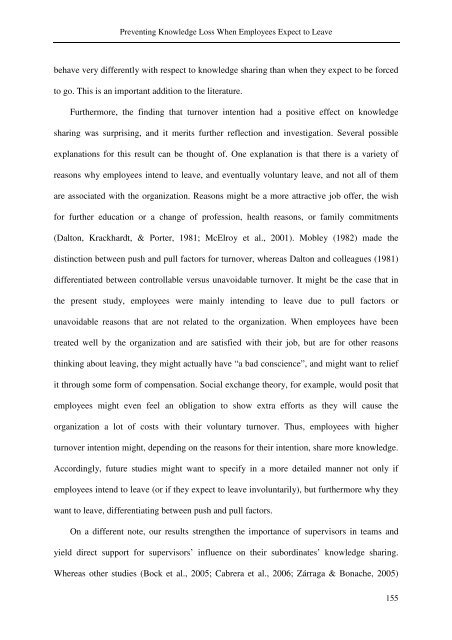thesis_Daniela Noethen_print final - Jacobs University
thesis_Daniela Noethen_print final - Jacobs University
thesis_Daniela Noethen_print final - Jacobs University
You also want an ePaper? Increase the reach of your titles
YUMPU automatically turns print PDFs into web optimized ePapers that Google loves.
Preventing Knowledge Loss When Employees Expect to Leave<br />
behave very differently with respect to knowledge sharing than when they expect to be forced<br />
to go. This is an important addition to the literature.<br />
Furthermore, the finding that turnover intention had a positive effect on knowledge<br />
sharing was surprising, and it merits further reflection and investigation. Several possible<br />
explanations for this result can be thought of. One explanation is that there is a variety of<br />
reasons why employees intend to leave, and eventually voluntary leave, and not all of them<br />
are associated with the organization. Reasons might be a more attractive job offer, the wish<br />
for further education or a change of profession, health reasons, or family commitments<br />
(Dalton, Krackhardt, & Porter, 1981; McElroy et al., 2001). Mobley (1982) made the<br />
distinction between push and pull factors for turnover, whereas Dalton and colleagues (1981)<br />
differentiated between controllable versus unavoidable turnover. It might be the case that in<br />
the present study, employees were mainly intending to leave due to pull factors or<br />
unavoidable reasons that are not related to the organization. When employees have been<br />
treated well by the organization and are satisfied with their job, but are for other reasons<br />
thinking about leaving, they might actually have “a bad conscience”, and might want to relief<br />
it through some form of compensation. Social exchange theory, for example, would posit that<br />
employees might even feel an obligation to show extra efforts as they will cause the<br />
organization a lot of costs with their voluntary turnover. Thus, employees with higher<br />
turnover intention might, depending on the reasons for their intention, share more knowledge.<br />
Accordingly, future studies might want to specify in a more detailed manner not only if<br />
employees intend to leave (or if they expect to leave involuntarily), but furthermore why they<br />
want to leave, differentiating between push and pull factors.<br />
On a different note, our results strengthen the importance of supervisors in teams and<br />
yield direct support for supervisors’ influence on their subordinates’ knowledge sharing.<br />
Whereas other studies (Bock et al., 2005; Cabrera et al., 2006; Zárraga & Bonache, 2005)<br />
155

















